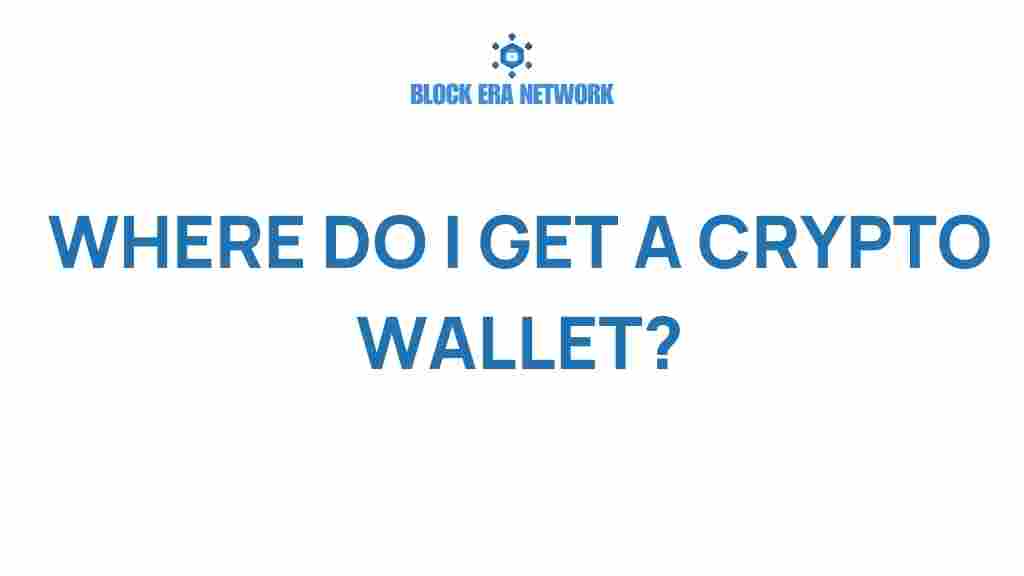Unlocking the Digital Vault: Where to Find Your Crypto Wallet
The world of digital currency has exploded in recent years, creating a need for secure and efficient ways to store these assets. Central to this is the concept of a crypto wallet, which acts as a digital vault for your cryptocurrency. With the rise of blockchain technology, understanding where to find and how to utilize your crypto wallet is essential for anyone venturing into this exciting financial frontier.
What is a Crypto Wallet?
A crypto wallet is a digital tool that allows you to store and manage your cryptocurrencies. Unlike traditional wallets that hold physical currency, a crypto wallet stores your private keys – the secure digital keys that give you access to your cryptocurrencies on the blockchain. The critical aspect of a wallet is its ability to facilitate transactions and secure your digital assets.
Types of Crypto Wallets
Understanding the different wallet types is crucial for selecting the one that best suits your needs.
- Hot Wallets: These are connected to the internet and are generally easier to use. They are suitable for everyday transactions but may be more vulnerable to hacks.
- Cold Wallets: These are offline storage solutions, such as hardware wallets or paper wallets. They offer enhanced security, making them ideal for long-term storage.
- Mobile Wallets: Designed for smartphones, these wallets allow for quick transactions on the go but are still considered hot wallets.
- Desktop Wallets: Installed on your computer, providing more control and security compared to mobile wallets but are still susceptible to malware.
- Web Wallets: Accessible through web browsers, these wallets are convenient but may pose security risks if the service provider is compromised.
Best Wallets for Cryptocurrency
Choosing the best wallets depends on your specific needs, such as security, convenience, and intended use. Here are some of the top options:
- Ledger Nano X: A popular hardware wallet known for its security and ease of use.
- Trezor Model T: Another trusted hardware wallet with a user-friendly interface.
- Exodus: A desktop and mobile wallet that combines usability with a wide range of supported currencies.
- Coinbase Wallet: A web and mobile wallet that integrates seamlessly with the Coinbase exchange.
- Trust Wallet: A mobile wallet that supports a vast array of cryptocurrencies and decentralized applications.
How to Find Your Crypto Wallet
Finding your crypto wallet can be straightforward if you follow these steps:
Step 1: Determine Your Wallet Type
Identify whether you are using a hot wallet, cold wallet, mobile wallet, or web wallet. This will help you understand where to look.
Step 2: Accessing a Hot Wallet
If you’re using a hot wallet, such as a mobile or web wallet, simply log in to the respective application or website. Make sure to use the correct credentials.
Step 3: Locating a Cold Wallet
If you have a cold wallet, such as a hardware wallet, retrieve the physical device. Connect it to your computer and follow the manufacturer’s instructions to access your wallet.
Step 4: Checking for Backups
If you’ve created a backup of your wallet, locate those backup files. Most wallets provide you with a recovery phrase when you set them up, which you can use to restore your wallet if necessary.
Troubleshooting Tips for Wallet Access
Sometimes, accessing your crypto wallet can come with challenges. Here are some troubleshooting tips:
- Forgotten Password: Use the password recovery option if available. Most wallets allow you to reset your password using your recovery phrase.
- Device Not Recognized: Ensure that your hardware wallet is properly connected to your computer. Try using a different USB port or cable.
- Malware Concerns: If you suspect malware, run a complete antivirus scan on your device before accessing your wallet.
- Outdated Software: Ensure that your wallet software is up to date to avoid compatibility issues.
Importance of Wallet Security
As you engage with cryptocurrencies, understanding wallet security is paramount. Here are some essential practices to enhance your wallet’s security:
- Enable Two-Factor Authentication: If your wallet supports it, enable 2FA for an extra layer of security.
- Use Strong Passwords: Create complex passwords that are difficult to guess.
- Keep Software Updated: Regular updates help protect against known vulnerabilities.
- Backup Your Wallet: Keep a secure backup of your wallet, including the recovery phrase, in a safe place.
- Be Cautious with Phishing: Always verify the website or application you are using to access your wallet.
Conclusion
In a world where cryptocurrency is becoming increasingly mainstream, knowing how to find and secure your crypto wallet is essential. From understanding the different wallet types to implementing robust wallet security measures, being informed will empower you in your digital currency journey. Whether you choose a hot wallet for convenience or a cold wallet for secure storage, always prioritize the safety of your assets.
For more information on cryptocurrency wallets, check out this detailed guide. You can also explore comparative insights on various wallets in our wallets comparison section.
This article is in the category Crypto Security and created by Block Era Network Team
